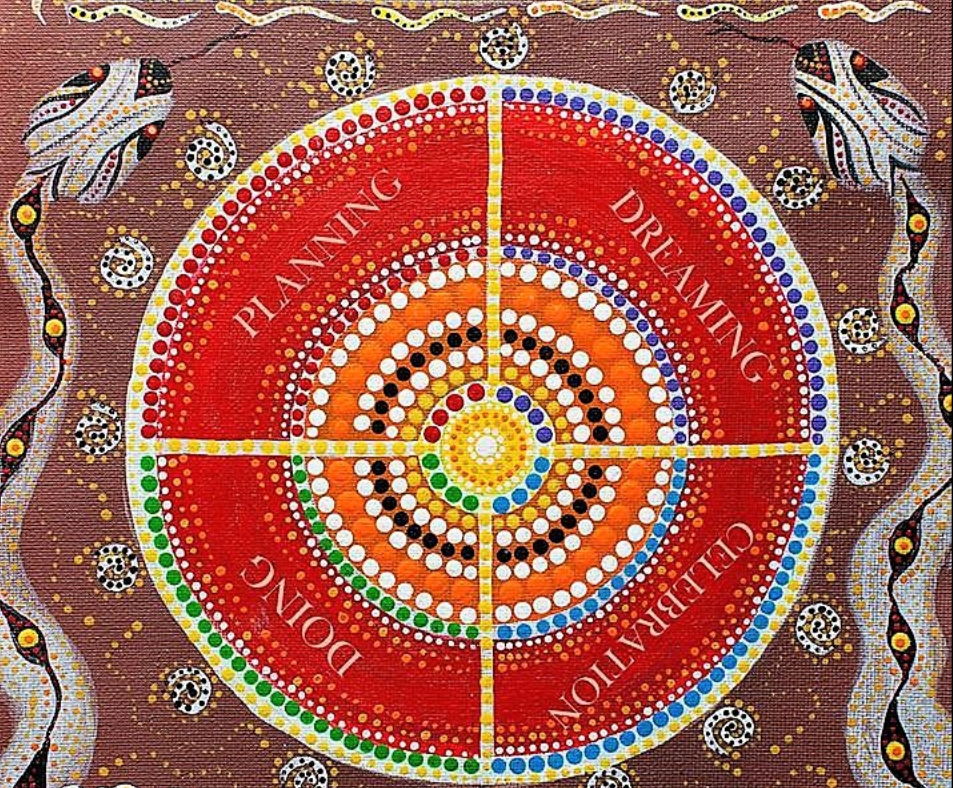We are happy and excited to have Felipe Simas back in Wageningen for another round of Dragon Dreaming! Last year’s introduction course was a big success, and personally we felt the impact of it long after Felipe went back to Brazil. But he is back again, and this time we want to take it a step further! Curious? Join us for the lunch lecture in Impulse on Tuesday May 16th. If you’re hooked, then make sure to reserve a space on the two day introduction course here. It will be in the building with the clock, Wageningen, on Saturday 20 and Sunday 21 May. Still wondering what Dragon Dreaming is? Read on below.
Dragon Dreaming offers methodsfor the realisation of creative, collaborative and sustainable projects and organisations, built upon three principles:
- personal growth – commitment to your own healing and empowerment
- community building – strengthening the communities of which you are a part
- service to the Earth – enhancing the wellbeing and flourishing of all life
Our activities are build upon a culture of a triple win-win-win. A win for ourselves personally, for the communities we live in and for the Earth as a whole. With Dragon Dreaming we are able not only to develop new skills. We also may discover new sides to ourselves and deepen our relationship with life. At the same time Dragon Dreaming strengthens community, helping us to build and sustain teams based on trust and cooperation, in which communication and appreciation are especially valued. Dragon Dreaming also fosters diversity, creativityand vitality, not only for ourselves and the team but rather for the whole world. Dragon Dreaming creates sustainability.
Dragon Dreaming offers simple and playful methods for
visionary processes, planning, implementation and evaluation
Dragon Dreaming is a playful, inspiring, encouraging and meaningful method for assisting individuals and groups who seek to make their dreams come true. It offers different people different theories, tools, tips, and techniques that can be added to improve the effectiveness of their existing ownwork. Alternatively it can provide a pathway, a learning journey, for individuals who have yearned for some time to make a difference and live a more meaningful life by trying something new.
Who is it for?
Dragon Dreaming can help
- people working with project management find inspiration and innovation for companies, organisations and business enterprises of all kinds;
- politicians and professionals working with urban, rural or regional development find new ideas for fostering community ownership and civic participation;
- grassroots movements find support with proven methods for the implementation of their ideas for bringing about change in the communities to which they belong;
- creative people and artists find methods which accommodate their own way of working that honours their talents and abilities;
- psychologists and coaches find playful methods for building visions, planning, implementing and celebrating new projects;
- everyday individuals who may not ever have tried to do something outstanding before but who seek a pathway of making a difference in their own lives and the lives of others.
Where does it come from?
Dragon Dreaming is inspired by social and environmental activism, the new physics, Gaia and Earth sciences, living systems and chaos and complexity theory, and the ancient sustainable wisdom of indigenous cultures and Australian Aborigines. The method integrates holisticaly aspects which have long been ignored, separated or divided in our cultures: our right and left brain hemispheres, logic and intuition, individual and environment, theory and practice, thought and action, work and play, success and failure. Dragon Dreaming is based on liberating collective intelligence, creativity, cooperation and the sleeping power within ourselves and inherent in our communities.
Read more about the philosophy behind it here
Read more about the introduction course here. Spaces on the courses will first be offered to WUR students and Toekomstboeren members. All others are more than welcome, but will be placed on a reserve list until it is clear how many spaces are available.
Sign up for the introduction course on May 20 and 21 here.


